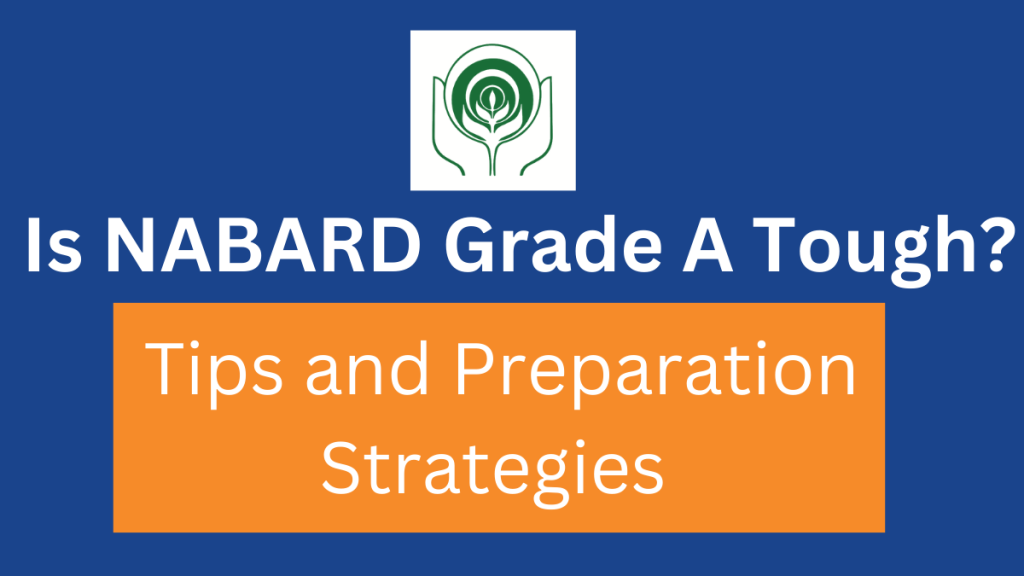The National Bank for Agriculture and Rural Development (NABARD) Grade A examination is a tall mountain to scale for anyone who dreams of impacting agriculture and rural development. As one of the most competitive exams in this sector, NABARD demands an intimate and detailed understanding of the subject. Anyone hoping to crack NABARD must have a detailed insight into the exam, the subject and most importantly, the exam itself. In this blog, we have done a detailed analysis on the different means and ways of cracking the NABARD Grade A exam in 2025. We have taken a detailed look at the syllabus, the exam pattern and some preparation strategies to aid you in your exam preparation.
The NABARD Grade A exam is quite well known for its challenging nature. To clear the NABARD Grade A exam, you need an in-depth knowledge of economic and financial principles. Those aspirants hoping to clear the exam and have a dream career with NABARD need a detailed strategy for their preparation. They need to devise a plan to combine their knowledge of different concepts and means to apply the same. Anyone attempting the NABARD Grade A exam should remember that it isn’t just a test of knowledge. Rather, it is a challenge which demands a completely holistic approach. Beyond the whirlpool of numbers, facts, statistics, and figures, aspirants should have detailed and intricate knowledge of the rural and agricultural landscapes. You must be aware of its challenges and the different solutions that can be made for this. Doing all this needs a strategic approach and a keen knowledge of the subject. Only with that can aspirants hope for a well-rounded plan for exam preparation.
This blog, as mentioned earlier is meant to be guide that doesn’t just shed light on the different aspects of the NABARD Grade A exam. It also helps NABARD hopefuls with the knowledge and strategy you need to crack this challenging exam.

NABARD Grade A Exam: Eligibility Criteria
Before diving into the preparation strategies, it’s very important to understand the eligibility criteria for the NABARD exam from the NABARD Grade A Notification. Since the recruitment drive for the coming year is at its conclusion, aspirants should begin preparing for the 2025 recruitment drive. While the notification is not expected for some time, you can get enough details of the exam from this year’s recruitment information. Those hoping to clear the exam should have a bachelor’s degree with a minimum of 60% marks (55% for reserved categories) or an equivalent CGPA. Additionally, there are certain educational qualifications required based on the post you have applied for. Anyone aspiring for the NABARD post should be aware of the age limits, nationality, and other criteria mentioned in the notification. This will ensure that they are eligible for the recruitment exam. Understanding the eligibility criteria for the NABARD Grade A Exam is needed for prospective applicants who want to pursue a career with opportunities available at NABARD. These criteria, including age limits, educational qualifications, and relevant experience are the most important parts that determine a candidate’s eligibility.
The NABARD Grade A Eligibility Criteria helps students establish a transparent pathway for preparing for the exams. For instance, the specified age range of 21 to 30 years and educational qualifications in finance, banking, and related fields create a diverse pool of applicants. Most importantly, the exam calls for fresh graduates, often without mandatory work experience requirements. This helps bring about inclusivity, serving as a gateway for young people to begin their careers in the government sector. The table below, outlining the key NABARD Grade A Eligibility Criteria will help candidates evaluate their qualifications for the exam.
| Eligibility Criteria | Requirements |
| Educational Qualifications | Bachelor’s Degree in any subject from any recognized University/Institution OR Post Graduate degree, MBA/PGDM OR CA/ CS/ICWA OR Ph.D from Institutions recognized by GOI/UGC. |
| Age Limit Criteria | 21 to 30 years |
| Age Relaxation | Applicable as per government norms |
| Work Experience | Not Required |
NABARD Grade A: Exam Pattern
You need to have a complete understanding of the exam pattern if you want to create successful preparation strategy for the exam. The NABARD Grade A Exam Pattern and Syllabus consists of three phases – Preliminary Exam, Main Exam, and Interview. The Preliminary Exam is objective, and it evaluates candidates in English, Quantitative Aptitude, Reasoning, and General Awareness. Candidates should note that the new section ‘Decision Making’ has been included in the Prelims. The Phase 2 exam introduces a few notable changes. Now, it has two papers with individual timings. Morever, the General English paper spans 90 minutes, while the Economic & Social Issues (ESI) paper is both objective and descriptive, with the objective segment lasting 30 minutes and the descriptive part moving to 90 minutes. The ESI paper focuses on Rural India for the General post and is discipline-specific for Specialist posts.
Candidates will move on to the Interview phase after they have cleared the NABARD Grade A Mains exam and secured a high grade. The Interview stage has a maximum weightage of 50 marks, and candidates shortlisted for it are in a ratio of 1:3. The Preliminary Exam tests foundational knowledge. At the same time, the Main Exam goes a little deeper, blending both objective and descriptive assessments. They now stress more on economic, social, agricultural, and rural development issues, all of which are important topics for NABARD. In addition to this, the Interview phase does an assessment of your ability to handle the NABARD Grade A post. Aspirants need to adjust their preparation strategies with this detail about the exam pattern. This will help make sure that they are well-equipped to understand and assess each phase successfully. You can understand the NABARD Grade A Exam Pattern and Syllabus more from the table below.
| NABARD Grade A Prelims Syllabus | ||||
| Nature of Test | Test Name | Questions | Marks | Time Duration |
| Qualifying | Quantitative Aptitude | 20 | 20 | Composite time of 120 minutes |
| Reasoning Ability | 20 | 20 | ||
| Computer Knowledge | 20 | 20 | ||
| English Language | 30 | 30 | ||
| Decision Making | 10 | 10 | ||
| Merit-Based | General Awareness | 20 | 20 | |
| Agriculture & Rural Development (with a focus on Rural India) | 40 | 40 | ||
| Economic and Social Issues (with focus on Rural India) | 40 | 40 | ||
| Total | 200 | 200 | 2 Hours | |
| NABARD Grade A Mains Syllabus | ||||
| Subject | Type of Paper | Questions | Marks | Duration |
| General English | Online Descriptive (Answers to be typed using keyboard) | 3 | 100 | 90 Minutes |
| Economic and Social Issues and Agriculture & Rural Development | Objective | 30 | 50 | 30 Minutes |
| Descriptive Type (Answers to be typed using keyboard either in English or Hindi (Remington and Inscript keyboards)) | 6 questions will be asked, of which candidates will be required to attempt 4 questions [2 of 15 marks each (with difficulty level) and 2 of 10 marks each] | 50 | 90 Minutes | |
| Total | 100 (Paper II) | 2 Hours (Paper II) | ||
NABARD Grade A: Syllabus
You need to have an excellent idea about the NABARD Grade A exam’s syllabus if you want to clear the exam. There is a wide range of highly important topics like agriculture and rural development, economic and social issues, English, quantitative aptitude, reasoning, and computer knowledge that is a part of the exam syllabus. With this detailed understanding, aspirants will be able to plan and prepare by adjusting the time as per their knowledge and understanding of these topics.
The Phase 2 (Mains) syllabus for NABARD Grade A caters itself to specific streams. Paper 2 concentrates more on Agriculture & Rural Development and Economic & Social Issues for the General stream, particularly in Rural India. You should know that for all specialized posts, there is a different syllabus in Paper 2. The topics in this focus far more on the specific field of expertise of the candidates. Quantitative Aptitude in Phase 1 includes various topics, which include Time and Work, Mensuration, Average, Speed, Distance and Time, Mixture and Allegations, Permutation and Combination, Probability, and more. English Language will include topics like Grammar, Vocabulary, Reading Comprehension, and other components. General Awareness consists of Monetary Policies, Banking & Financial Awareness, and Current Affairs, which can be found in ixamBee’s BeePedia platform, while Reasoning Ability includes Puzzles, Seating Arrangement, Data Efficiency, and more.
Along with this, Computer Knowledge like the topic suggests includes Computer Languages, Hardware, and Software, while the new subject Decision Making involves Behavioral, Managerial, and Criteria-based Decision Making. This detailed explanation of the syllabus will help candidates get themselves a roadmap that will help them prepare for the exam better. It also will make sure that they cover all essential areas while ensuring that they are well-equipped to tackle the topics set for the NABARD Grade A exam. In addition to this, subjects like ESI, Agriculture and Rural Development focus on important topics on the Indian Economy since Independence. Aspirants should check out the syllabus below to plan their study plans and prepare for the exam better.
| Subject | Topics |
| Quantitative Aptitude | Time and Work, Mensuration, Average, Speed, Distance and Time, Mixture and Allegations, Permutation and Combination, Probability, Data Interpretation, Ratio & Proportion, Simplification & Approximation, Percentage, Set Theory, Data Interpretation, Quadratic Equation, Number Series, Profit & loss, Boats & Stream, Simple and Compound Interest, Data Sufficiency |
| English Language | Grammar, Vocabulary, Reading Comprehension, Passage Making, Error Spotting, Jumble Words, Sentence Framing, Fill in the Blanks, Cloze Test, Sentence Rearrangement, Idioms & Phrases |
| General Awareness | Monetary Policies, Banking & Financial Awareness, Economic Terms, Current Affairs, Static GK, Financial & Economics News, Government Schemes, Agreement & Deals, Banking terms, rates, processes, National Institution |
| Reasoning Ability | Puzzles, Seating Arrangement – Circular, Square and Linear, Data Sufficiency, Directions and Distance, Coding Decoding, Blood Relations, Inequality, Syllogism, Machine Input Output, Verbal Reasoning, Ordering and Ranking, Alphanumeric Series |
| Computer Knowledge | Computer Languages, Basic Hardware and Software, History of Computer, Devices, Viruses and Hacking, MS Office, Networking |
| Decision Making | Behaviour Decision Making,Managerial Decision making,Eligibility Criteria based decision making,Data Arrangements Based Decision making |
| Agriculture | Agriculture, Meteorology, Soil and Water Conservation, Water Resource: Irrigation Management, Farm and Agri Engineering, Plantation & Horticulture, Animal Husbandry, Fisheries, Aquaculture- Inland and marine; Importance of fisheries in India, Basic concepts of Forest and Forestry, Recent developments under Ministry of Environment, Forest and Climate Change, Agriculture Extensions, Role of Krishi Vigyan Kendra’s (KVK) in disseminating Agricultural technologies, Ecology and Climate Change, Green House Gases (GHG), major GHG emitting countries, IPCC, UNFCCC, CoP meetings, initiatives by Govt of India, NAPCC, SAPCC, INDC. Present Scenario of Indian Agriculture and Allied activities, Factors of Production in Agriculture; Agricultural Finance and Marketing |
| Rural Development | Concept of Rural Area, Structure of the Indian Rural Economy Importance and role of the rural sector in India- Economic, Social and Demographic Characteristics of the Indian rural economy, Rural population in India: Occupational structure, Farmers, Agricultural Labourers, Artisans, Handicrafts, Traders, Forest dwellers/tribes and others in rural India- Trends of change in rural population and rural workforce, Issues and challenges in Handlooms, Panchayati Raj Institutions, MGNREGA, NRLM – Aajeevika, Rural Drinking water Programmes, Swachh Bharat, Rural Housing, PURA and other rural development programmes |
| Economic & Social Issues | Nature of Indian Economy , Globalisation, Economic Reforms in India, Privatisation. Inflation – Trends in Inflation & their Impact on National Economy and Individual Income. Poverty Alleviation and Employment Generation in India – Rural and Urban, Population Growth and Economic Development, Technical and Institutional changes in Indian Agriculture, Agricultural performance, Issues in Food Security in India, Industry – Industrial and Labour Policy, Industrial performance, Regional Imbalance in India’s Industrial Development, Public Sector Enterprises, Rural banking and financial institutions in India, Globalisation of Economy – Social Structure in India Education – Social Justice: Problems of scheduled castes and scheduled tribes – socio-economic programmes for scheduled castes and scheduled tribes and other backward classes. Human Development, Current Economic & Social Issues. |
NABARD Grade A: Best Books
In order to help you prepare for the NABARD Grade A exam, it is important to make use of the assistance you are provided. This means taking assistance from some of the best books available in the market. These books will help you prepare for the exam based on the detailed syllabus provided earlier. This strategic approach ensures that you can use your time efficiently. This will lessen the risk of wasting valuable hours on menial tasks that don’t help you study. By seeking help from these books and planning your preparation accordingly, aspirants can plan . You should know that this means that you will be able to focus on core topics that you need to score well in the exam. The table below offers some information on the chosen books along with their author and publisher name so that hopefuls can access these books. valuable insights into the study material, serving as a useful reference point for aspirants. By choosing the best books and the ixamBee resources they are give, students will be better suited to preparing for the exam. For this, they can use the NABARD Grade A Study Plan which will help prepare better. This will also help increase the chances of becoming more successful in this exam. When they make use of the time they have wisely, aspirants will be able to prepare for their exam better with the resources we provide them.
| Paper | Book | Author/Publisher |
| Economic and Social Issues | Indian Economy | Uma Kapila or Mishra Puri |
| Indian Economy | Ramesh Singh | |
| Indian Social System | Ram Ahuja / Rawat Publications | |
| Agriculture & Rural Development | Agriculture at a Glance | R K Sharma and S K Bhoi |
| Rural Development | GPH Panel of Experts | |
| Fundamental Of Agriculture Vol 2 | Arun Katyan | |
| A Competitive Book of Agriculture | Nem Raj Sunda | |
| Finance | Financial Management | I M Pandey |
| Financial management: Theory and Practice | Prasanna Chandra | |
| Cost accounting | Grewal and Gupta | |
| Management accounting | Khan and Jain | |
| Padhuka’s Students’ Handbook on Auditing & Assurance | G.Sekar and Saravana Prasad | |
| Management Accounting | R.S.N. Pillai and V. Bagavathi | |
| Quantitative Aptitude | Quicker Mathematics | BSC Publications |
| Quantitative Aptitude | RS Agarwal | |
| Class Notes | SS Bharti | |
| Reasoning Ability | A modern approach to verbal & Non-verbal reasoning | R.S. Aggarwal |
| Verbal & Non-Verbal Reasoning | S.Chand | |
| Verbal & Non-Verbal Reasoning | Arihant Publication | |
| English Language | English Grammar | Wren & Martin |
| Made Easy for English | Norman Lewis | |
| Descriptive General English | SP Bakshi | |
| Computer Awareness | Objective Computer Awareness | Arihant |
| General Awareness | Lucent GK Knowledge | Lucent Publication |
NABARD Grade A: Preparation Strategies
With the NABARD Recruitment cycle for the current year coming to a close and the 2025 cycle just a few months away from being open, now is the right time to begin your exam preparation. Now that we have talked about the exam pattern and syllabus, let us take a look at some of the tips to help you prepare for the NABARD Grade A Exam.
- Understand the Exam Pattern and Syllabus: Before you begin your exam preparation, it is important that you try to understand the exam pattern and syllabus for NABARD. This rather basic step is quite important if you want to chart out an effective study plan. Doing this will help you allocate time efficiently. A clear understanding of the exam’s format and topics will be helpful for you. It will prepare you when it comes to planning out your exam preparation. You will be able to focus on key areas and improvise your preparation too. This simple step will help you become more well-organized and help you in preparing for the examination successfully.
- Create a Realistic Study Schedule: The next step is to come up with a more practical schedule that is suitable for the remaining time before the NABARD Grade A exam. Devote enough time to each section. Make sure that you have a balanced approach to your preparation. Give importance to the topics based on your strengths and weaknesses. This means you need to take more time for subjects you need to improve. This strategy will help you improve your proficiency in challenging subjects while reinforcing your strengths.
- Use High-Quality Study Materials: Improve upon your exam preparation by taking time to collect high-quality study materials and recommended books. You need to build a strong foundation in the subjects you know while building a base for those you’re not comfortable in. You also need to use online resources like ixamBee’s NABARD Grade A Online Course and practice papers to improve your understanding of the subject and improve your exam-solving skills. With the right study materials and a conceptual focus, you can elevate your preparation and increase your chances of success in the NABARD Grade A exam.
- Focus on Basics: The simplest strategy is simply build your basics. This means making sure that your basic knowledge in in subjects like Quantitative Aptitude, Reasoning, and English are strong. This is because they are the important parts for the specialized sections related to agriculture and rural development in the NABARD Grade A exam. A strong foundational knowledge in these subjects will help you lay the groundwork for tackling the more complex topics within the agricultural and rural development sections.
- Current Affairs: Another important strategy is to make sure you have a very strong base in current affairs, particularly in events that relate to agriculture, rural development, and the economy. You need to be updated on this by regularly reading newspapers and magazines. You should also check out online platforms and social media to be updated on the events happening around the world. These sources offer valuable insights into the latest developments, policies, and trends. They also help in contributing to your knowledge base on current affairs. By staying updated on current affairs topics like the Union Budget and Economic Survey, you enrich your knowledge and enhance your ability to apply relevant information during the NABARD Grade A exam.
- Mock Tests and Previous Year Papers: You need to keep up the regular practice of attempting mock tests and solving previous year papers into your NABARD Grade A exam preparation routine. This strategic approach will bring you close to the exam structure and help you improve upon your time management skills. This in turn, will help you understand those areas that need more of a focus. NABARD Grade A Free Mock Tests by ixamBee will recreate the actual exam environment, allowing you to assess your performance. You can also identify your strengths and pinpoint your weaknesses. too. Moreover, you can gain insights into question patterns and focus on areas by systematically analyzing your performance in them and NABARD Grade A Previous Year Papers, enabling a focused improvement.
- Revision is Key: They say practice makes perfect and we really couldn’t agree more. You need to constantly update your understanding of the topics. This can only be done regularly revising the material repeatedly. You should try to create more concise and comprehensive notes that includes all the important key concepts for easier revision. This is quite important in the final days leading up to the NABARD Grade A exam. This revision strategy strengthens your memory and helps ensure all the important information is readily accessible during the exam.
- Healthy Lifestyle: Don’t forget to prioritize a healthy lifestyle. This can only be done by ensuring that you get adequate sleep, maintaining a well-balanced diet, and being more active. When you have a harmonious lifestyle, it helps to bring about better concentration and improves your inane cognitive abilities. Getting good quality sleep revitalizes your mind. It allows you to focus more during study sessions. A healthy and nutritious diet, along with this also provides the necessary fuel for sustained focus and mental clarity.
- Stay Positive: You should try to maintain a positive attitude throughout your NABARD Grade A exam preparation. You need to have some confidence in your efforts. Remember that you need to always stay calm during the exam. Don’t think about what happens after the exam. But focus on writing the actual exam well and performing up to your level best. When you have a positive mindset, it improves your overall well-being. It also contributes to better concentration and decision-making during important moments. You need to have some level of trust in your preparation. Try to stay composed and approach the exam with a focused and optimistic outlook.
- Seek Guidance: Have you encountered any challenges in any section? Get some guidance from teachers, mentors, or online forums. Engaging in discussions, clarifying doubts, and seeking guidance can significantly improve your understanding of topics you don’t understand. Making use of external support ensures you have access to diverse perspectives and insights. This will help you overcome obstacles and reinforcing your understanding better.
Summing Up:
If you want to crack the NABARD Grade A exam in the upcoming exam cycle of 2025, you need to have the utmost dedication, strategic planning, and effective execution of this strategy. The first steps are to understand the eligibility criteria, exam pattern, and s then you need to be clear in your understanding of the exam patter and syllabus. The next step is to get all the study materials and online resources in your hands. After that, you need to incorporate a calm mind and focus on the topics you find challenging while being thorough in those topics you already have expertise in. Adopting these strategies will prepare you for the challenges posed by the exam and help you clear it effortlessly.
At ixamBee, we specialize in providing comprehensive online courses for government exams and online courses for government jobs. Our expertly designed courses for government jobs cater to a wide range of Upcoming Government Exams. Whether you’re preparing for specific courses for government exams or seeking general guidance, ixamBee offers resources like BeePedia, Previous Year Papers, SSC CGL, SSC CHSL, SSC MTS, and other Mock Tests to succeed in exams like RBI Grade B, SEBI Grade A, NABARD Grade A, RRB NTPC, SSC MTS, NIACL Assistant, and more.
Also Read
Top Government Job Opportunities After BTech in 2024: Your Ultimate Guide to a Rewarding Career
How to Write Descriptive Answers in ESI NABARD Grade A Phase 2 Exam 2024?
What To Do While Preparing for NABARD Grade A Phase 2 Exam














